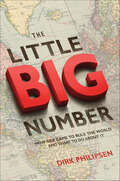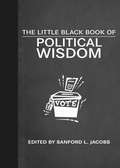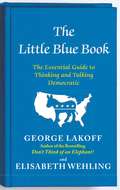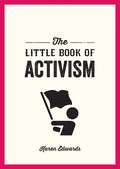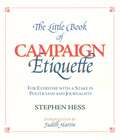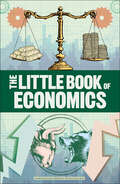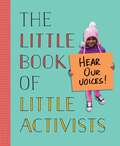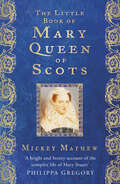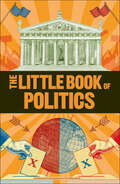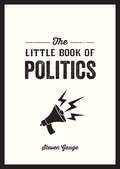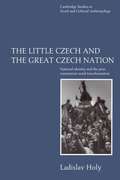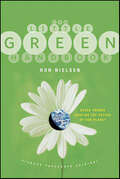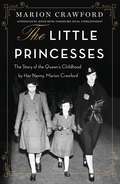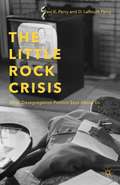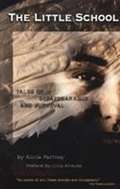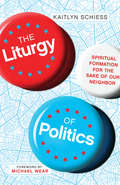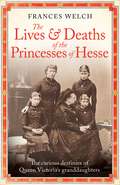- Table View
- List View
The Little Big Number: How GDP Came to Rule the World and What to Do About It
by Dirk PhilipsenThe story of GDP and why we need a better measurement of growthIn one lifetime, GDP, or Gross Domestic Product, has ballooned from a narrow economic tool into a global article of faith. As The Little Big Number demonstrates, this spells trouble. While economies and cultures measure their performance by it, GDP only measures output. It ignores central facts such as quality, costs, or purpose. Sustainability and quality of life are overlooked. Losses don't count. The world can no longer afford GDP rule—GDP ignores real development. Dirk Philipsen demonstrates how the history of GDP reveals unique opportunities to fashion smarter goals and measures. The Little Big Number explores a possible roadmap for a future that advances quality of life rather than indiscriminate growth.
The Little Black Book of Political Wisdom (Little Red Books)
by Sanford L. JacobsPolitics. It's a word that carries a great deal of weight, and there have been many words spoken about it ever since human beings decided it might be a good idea to come down from the trees and form some kind of government. The Little Black Book of Political Wisdom is an engaging collection of the wisest, funniest, and most insightful words ever said about the world of politics. Gathered here are hundreds of quotations from statesmen and stateswomen, philosophers, foreign leaders, journalists, and other politically astute observers from ancient times to present day.Here are some examples:"Politics, as a practice, whatever its professions, has always been the systematic organization of hatreds." -Henry Adams"I have learned that one of the most important rules of politics is poise-which means looking like an owl after behaving like a jackass." -Ronald Reagan"Politics are almost as exciting as war, and quite as dangerous. In war you can be killed once, but in politics many times." -Sir Winston Churchill"We hang the petty thieves and appoint the great ones to public office." -Aesop"Giving money and power to government is like giving whiskey and car keys to teenage boys." -P. J. O'Rourke
The Little Blue Book
by George Lakoff Elisabeth WehlingThe indispensable handbook for Democrats Voters cast their ballots for what they believe is right, for the things that make moral sense. Yet Democrats have too often failed to use language linking their moral values with their policies. The Little Blue Book demonstrates how to make that connection clearly and forcefully, with hands-on advice for discussing the most pressing issues of our time: the economy, health care, women's issues, energy and environmental policy, education, food policy, and more. Dissecting the ways that extreme conservative positions have permeated political discourse, Lakoff and Wehling show how to fight back on moral grounds and in concrete terms. Revelatory, passionate, and deeply practical, The Little Blue Book will forever alter the way Democrats and progressives think and talk about politics.
The Little Book of Activism: A Pocket Guide to Making a Difference
by Karen EdwardsEveryone has the power to make a difference in the world, as long as they know where to start. Drawing inspiration from celebrated activists and their groundbreaking work, this empowering little book will introduce you to the key forms of contemporary activism, showing you how you can engage in political and social movements. You’ll have everything you need to stand up and be a force for change.
The Little Book of Campaign Etiquette: For Everyone with a Stake in Politicians and Journalists
by Judith Martin Stephen HessRevised and updated just in time for the 2000 campaign, this shrewd and amusing series of observations provides a political etiquette for campaign behavior on the part of both politicians and journalists. Features illustrations by America's foremost political cartoonists, including Herblock, Paul Conrad, Jeff McNally, Don Wright, Garry Trudeau, Jim Borgman, Mike Peters, Tom Toles, Mike Luckovich, Steve Benson, and Walt Handelsman. "Stephen Hess has stepped into the breach with answers to questions that ought to be more frequently asked...This breezy book is likely to be of interest to anyone who follows - or worries about - the state of the nation's political discourse." - USA Today
The Little Book of Economics (DK Little Book of)
by DKThis book is the perfect introduction to the subject of economics and economic ideas throughout history.From the earliest forms of currency to the Industrial Revolution, and from the birth of the stock market to free-market capitalism and globalized trade, The Little Book of Economics brings economic theory and the work of key economists to life. Journeying through centuries of economic thought, it is the perfect pocket-sized guide to the subject.Packed with infographics and flowcharts that explain complex concepts clearly and simply, The Little Book of Economics offers you the same combination of clear text and hard-working infographics in a portable format that is perfect for reading on the go.
The Little Book of Going Green: Really Understand Climate Change, Use Greener Products, Adopt a Tree, Save Water, and Much More! (The\little Book Of Ser.)
by Harriet Dyer“We have forgotten how to be good guests, how to walk lightly on the earth as its other creatures do.” —Barbara Wood The Little Book of Going Green aims to shed light on the ways humans are harming the environment, from pollution and deforestation to industrial production and farming methods. Before we can fix a problem, we must have a basic understanding of what brought us there in first place. Dyer explores past events and actions before directing our attention to the future through the exploration of how climate change has been affected by:PlasticsFossil FuelsIndustrial AgricultureDeforestationHuman Population In addition, Dyer explores how we can easily practice sustainability and conservation on both individual and corporate levels, creating habits at home that we can then bring to our workplaces. How can we reduce plastic waste in our homes? How can we reduce our carbon footprint in the office? Filled with facts, theories, and tips on how we can do our bit for the planet, this is your one-stop guide to making every aspect of your life earth-friendly.
The Little Book of Little Activists
by Penguin Young ReadersA celebration of political activism by America's youngest citizens--our children.You're never too young to care about your community or to stand up for your beliefs. That's the empowering message of this book, which is all about how real kids exercise their first amendment rights.Filled with inspiring photos of children at recent demonstrations and rallies, The Little Book of Little Activists also includes inspirational quotes from kids themselves on topics of equality, diversity, and feminism, as well as an introduction by Bob Bland, co-chair of the Women's March on Washington, and an afterword by civil rights activist Lynda Blackmon Lowery, author of Turning 15 on the Road to Freedom: My Story of the 1965 Selma Voting Rights March. Five percent of gross proceeds go to benefit the Children's Defense Fund.The Little Book of Little Activists is a child's very first introduction to political activism, presented at a level that they can understand and relate to. Perfect for parents who want to raise their kids to become participatory members of a democracy.
The Little Book of Mary Queen of Scots
by Mickey MayhewMary Queen of Scots is perhaps one of the most controversial and divisive monarchs in regal history. Her story reads like a particularly spicy novel, with murder, kidnap, adultery, assassination and execution. To some she is one of the most wronged women in history, a pawn used and abused by her family in the great monarchical marriage game; to others, a murderous adulteress who committed regicide to marry her lover and then spent years in captivity for the crime, endlessly plotting the demise of her cousin, Queen Elizabeth I of England.This book covers the breathtaking scope of her amazing life and examines the immense cultural legacy she left behind, from the Schiller play of the 1800s to The CW teen drama Reign. Temptress, terrorist, or tragic queen, this book will give you the lowdown on one of history’s most misunderstood monarchs.
The Little Book of Politics (DK Little Book of)
by DKThis book is the perfect pocket-sized introduction to politics and political thought throughout history.From the origins of democracy to Machiavelli's cunning statecraft, and from Rousseau's "social contract" to the American Declaration of Independence, Marxist communism, the dawn of populism, and identity politics, The Little Book of Politics examines the philosophies behind the different political beliefs and methods of government used around the world over the course of human history. Packed with infographics and flowcharts that explain complex concepts in a simple but exciting way, The Little Book of Politics offers you a combination of clear text and hard-working infographics in a portable format that is perfect for reading on the go.
The Little Book of Politics: A Pocket Guide to Parties, Power and Participation
by Steven GaugeWorried about the world and want to make a difference? Inspired by a new political voice or enraged by an old one? Finding out how to play your part in the political process has never mattered more.Politics finds its way into almost every corner of our lives. While the plotting, scheming and petty point-scoring might put some off, others thrive on it, and passions rise when the issues affect people’s lives. Politics is too important to leave to the politicians, so this little book would like to warmly welcome you into the political world. It will be your handy guide as you take your first tentative steps towards becoming politically active. With a bit of the history, the things you need to know today and a few tricks of the trade, it will help you to change the world for the better and stand up for what you believe.Whether you’re taking your first tentative steps into the world of politics or thinking about getting out and knocking on some doors, this clear and concise guide is for you. Providing a whistle-stop tour through the corridors of power and explaining the basics of our parliamentary democracy, it will inspire you to take action.
The Little Book of Rob Ford
by Unknown TorontonianWatch out, Sarah Palin -- here comes Rob Ford! Love him or hate him, Rob Ford and his public (mis)statements are endlessly entertaining, often antagonizing, and always outrageous. For the first time ever, here are more than 100 of the best quips, quotes, jabs, and gaffes from one of Canada's most colourful and controversial politicians. Whether he infuriates you or fascinates you, The Little Book of Rob Ford is a must-have for fans and foes alike!
The Little Czech and the Great Czech Nation: National Identity and the Post-Communist Transformation of Society
by Ladislav HolyThe book intends to investigate the specific ways in which Czech cultural meanings and the accompanying nationalist sentiments have affected life under communism, its overthrow, and the political and economic transformation of post-communist society.
The Little Green Book of Eco-Fascism: The Left?s Plan to Frighten Your Kids, Drive Up Energy Costs, and Hike Your Taxes!
by James DelingpoleWritten in A to Z format and printed on guaranteed un-recycled paper made from the pulp of a thousand rare hardwood trees using nothing but the purest cruel-harvested baby squid ink, ,The Little Green Book of Eco-Fascism is your pocket guide to everything that's wrong, funny, and downright crazy about the green movement
The Little Green Handbook: Seven Trends Shaping the Future of Our Planet
by Ron NielsenPublished for the first time in the United States, The Little Green Handbook is a unique reference work that illustrates the most important global developments facing us today, explains them, and suggests area for positive change. It relates physical trends to social and political repercussions, drawing together evidence from many interrelated fields to explain the science behind the news stories, sound bytes, and cocktail-party banter. Just how serious are our environmental problems? Are we doing enough to deal with them? How many people can the planet sustain? What are the long-term effects of continued environmental damage? How fast is the process of global warming? What are the implications of our continued dependence on fossil fuels?The Little Green Handbook has the answers. This user-friendly sourcebook is filled with up-to-date facts and figures, making complex but vitally important ideas simple. It is our duty to ensure a sustainable future for our children; The Little Green Handbook gives us the information we need to make this possible.
The Little Princesses: The extraordinary story of the Queen's childhood by her Nanny. Perfect for readers of The Lady in Waiting
by Marion Crawford'A unique insight into the isolated childhood of the future queen and her sister' YOU MAGAZINE, THE DAILY MAIL~The touching and ground-breaking stories of the Queen and Princess Margaret's childhoods told by their nanny, Marion Crawford. With a foreword by former BBC Royal Correspondent Jennie Bond, Marion reveals the royal family's life before The Crown.Now, more than ever, the Royal Family's private lives are the stuff of soap opera and it seems anyone who comes into contact with them sells their story to the magazines or to the newspapers. Marion Crawford, 'Crawfie', as she was known to the Queen and Princess Margaret, became governess to the children of the Duke and Duchess of York in the early 1930s, little suspecting she was nurturing her future Queen. Beginning at the quiet family home in Piccadilly and ending with the birth of Prince Charles at Buckingham Palace in 1948, Crawfie tells how she brought the princesses up to be 'Royal' whilst also exposing them to the ordinary world of underground trains, buses and swimming lessons. THE LITTLE PRINCESSES was published in 1950 to a furore we cannot imagine today. Crawfie was demonised by the press, and the Queen Mother - who had been a great friend and who had, Crawfie maintained, given her permission to write the account - never spoke to her again.
The Little Princesses: The extraordinary story of the Queen’s childhood by her Nanny. Perfect for readers of The Lady in Waiting
by Marion Crawford'A unique insight into the isolated childhood of the future queen and her sister' YOU MAGAZINE, THE DAILY MAIL~The touching and ground-breaking stories of the Queen and Princess Margaret's childhoods told by their nanny, Marion Crawford. With a foreword by former BBC Royal Correspondent Jennie Bond, Marion reveals the royal family's life before The Crown.Now, more than ever, the Royal Family's private lives are the stuff of soap opera and it seems anyone who comes into contact with them sells their story to the magazines or to the newspapers. Marion Crawford, 'Crawfie', as she was known to the Queen and Princess Margaret, became governess to the children of the Duke and Duchess of York in the early 1930s, little suspecting she was nurturing her future Queen. Beginning at the quiet family home in Piccadilly and ending with the birth of Prince Charles at Buckingham Palace in 1948, Crawfie tells how she brought the princesses up to be 'Royal' whilst also exposing them to the ordinary world of underground trains, buses and swimming lessons. THE LITTLE PRINCESSES was published in 1950 to a furore we cannot imagine today. Crawfie was demonised by the press, and the Queen Mother - who had been a great friend and who had, Crawfie maintained, given her permission to write the account - never spoke to her again.
The Little Quiz Book of Big Political Sex Scandals
by Paul SlanskyPolitics and sex. Nothing captures the attention of the media -- and satisfies the public's thirst for schadenfreude -- quite like our elected officials getting caught with their pants down. In The Little Quiz Book of Big Political Sex Scandals, renowned satirist and New York Times bestselling author Paul Slansky provides a guided tour of this torrid realm of public life. Through a comprehensive compendium of quizzes, incorporating his trademark Q&A format, Slansky chronicles the political sex-scapades of the past half century -- Bill's cigar and Monica's stained dress, Gary Hart's cruise on the good ship Monkey Business, Larry Craig's restroom romancing, and scores of other career-ending shenanigans. Devastatingly funny yet also meticulously researched and historically relevant, this irreplaceable guide to the headline-grabbing events, the reluctant apologies, and the inevitable consequences -- and, of course, the anguished spouses standing by their men -- offers an endlessly entertaining peek under the covers of our political establishment.
The Little Rock Crisis
by Ravi K. Perry D. Larouth PerryThe Little Rock Crisis describes the power of direct and learned memories of the 1957 desegregation crisis in Little Rock, Arkansas. Personal, dramatic experiences of Little Rockians – known and unknown – reflect on the impact of the crisis on their lives in the 21st century. Linking individual memories to collective action through the lens of social appropriation, the book explores how the crisis has impacted the political behavior of Little Rockians. Oral histories and surveyresearch show how the events from the tumultuous 1950s in Little Rock school politics, inform and direct the national political engagement and local community involvement of diverse residents.
The Little School: Tales of Disappearance and Survival
by Alicia PartnoyEach chapter of this book is introduced by a picture of a blindfolded woman, her hands barely lifting the flap of her kerchief. To prevent prisoners from communicating with and knowing each other, and more importantly, their captors, inmates are kept blindfolded at all times in the "Little School" which is a grim euphemism for the prison camp where the disappeared are tortured and await their fates. These gauze blindfolds are continually slipping, and the pris¬oners are required to summon the guard on duty to tighten them on pain of being beaten or worse if the blindfold is dis¬covered to be loose. Each chapter of this book is introduced by a picture of a blindfolded woman, her hands barely lifting the flap of her kerchief. To prevent prisoners from communicating with and knowing each other, and more importantly, their captors, inmates are kept blindfolded at all times in the "Little School" which is a grim euphemism for the prison camp where the disappeared are tortured and await their fates. These gauze blindfolds are continually slipping, and the prisoners are required to summon the guard on duty to tighten them on pain of being beaten or worse if the blindfold is discovered to be loose. Alicia Partnoy spent more than three months in the Little School before she was transferred to a state prison, where she stayed for more than two years. The readers of her fictionalized account can be thankful that she learned to peep, glimpse, see, and, because such seeing involves the imagination, to envision the veiled world around her. What is amazing, given the brutal and terrifying nature of that world, is that Partnoy could notice the details of its grace and durability. From the true heart of darkness come these tales, recorded in twenty epiphanies of sight and insight.
The Little Secret
by Kate Saunders William CarmanWhen she is invited to her new friend's home for summer vacation, eleven-year-old Jane discovers that, Staffa and her family are not what they seem to be.
The Liturgy of Politics: Spiritual Formation for the Sake of Our Neighbor
by Kaitlyn SchiessA generation of young Christians are weary of the political legacy they've inherited and hungry for a better approach. They're tired of seeing their faith tied to political battles they didn't start, and they're frustrated by the failures of leaders they thought they could trust. Kaitlyn Schiess grew up in this landscape, and understands it from the inside. Spiritual formation, and particularly a focus on formative practices, are experiencing a renaissance in Christian thinking—but these ideas are not often applied to the political sphere. In The Liturgy of Politics, Schiess shows that the church's politics are shaped by its habits and practices even when it's unaware of them. Schiess insists that the way out of our political morass is first to recognize the formative power of the political forces all around us, and then to recover historic Christian practices that shape us according to the truth of the gospel.
The Livable and the Unlivable
by Judith Butler Frédéric WormsThe unlivable is the most extreme point of human suffering and injustice. But what is it exactly? How do we define the unlivable? And what can we do to prevent and repair it? These are the intriguing questions Judith Butler and Frédéric Worms discuss in a captivating dialogue situated at the crossroads of contemporary life and politics. Here, Judith Butler criticizes the norms that make life precarious and unlivable, while Frédéric Worms appeals to a “critical vitalism” as a way of allowing the hardship of the unlivable to reveal what is vital for us.For both Butler and Worms, the difference between the livable and the unlivable forms the critical foundation for a contemporary practice of care. Care and support, in all their aspects, make human life livable, that is, “more than living.” To understand it, we must draw on the concrete practices of humans who are confronted with the unlivable: the refugees of today and the witnesses and survivors of past violations and genocide. They teach us what is intolerable but also undeniable about the unlivable, and what we can do to resist it. Crafted with critical rigor, mutual respect, and lively humor, the compelling dialogue transcribed and translated in this book took place at the École Normale Supérieure (ENS) on April 11, 2018, at a time when close to two thousand migrants were living in nearby makeshift camps in northern Paris. The Livable and the Unlivable showcases this 2018 dialogue in the context of Butler’s and Worms’s ongoing work and the evolution of their thought, as presented by Laure Barillas and Arto Charpentier in their equally engaging introduction. It concludes with a new afterword that addresses the crises unfolding in our world and the ways a philosophically rigorous account of life must confront them.While this book will be of keen interest to readers of philosophy and cultural criticism, and those interested in vitalism, new materialism, and critical theory, it is a far from merely academic text. In the conversation between Butler and Worms, we encounter questions we all grapple with in confronting the distress and precarity of our times, marked as it is by types of survival that are unlivable, from concentration camps to prisons to environmental toxicity, to forcible displacement, to the Covid pandemic.The Livable and the Unlivable at once considers longstanding philosophical questions around why and how we live, while working to retrieve a philosophy of life for today’s Left.
The Lives and Deaths of the Princesses of Hesse: The curious destinies of Queen Victoria's granddaughters
by Frances WelchA gripping family saga and a portrait of a world in turmoilThe Princesses of Hesse were Queen Victoria's grandchildren. After the sudden death of her daughter Alice, Queen Victoria took an obsessive interest in the marriage prospects of the four girls she left behind. Very little went according to plan. Fortunately, Queen Victoria did not live to see her direst fears for the girls spouses being realised. She died in January 1901, just before her beloved Hesse granddaughters became caught up in the maelstrom of early 20th century Europe. The youngest sister, Alix, married Tsar Nicholas II of Russia; she was assassinated, along with the rest of her family, in a cellar in Ekaterinburg. The second, Ella, married the Russian Grand Duke Serge. After he was assassinated, she became a nun, only to be assassinated by the Bolsheviks twenty-four hours after Alix in 1918. The third, Irene, married the Kaiser's brother, Prince Henry, and was entangled in the 1918 German uprisings. The eldest sister, Princess Victoria, married Prince Louis Battenberg, and became the mother of Lord Louis Mountbatten and grandmother of Prince Philip, Duke of Edinburgh.Their lives were all dramatic, and this group biography shows how they interacted as sisters, forever jostling for status and relaying the politics and intrigues that surrounded them. Drawing on hundreds of previously unseen letters from the sisters as well as from their grandmother Queen Victoria, The Princesses of Hesse takes us on a sweeping journey across the tumultuous landscape of the turn of the century - from the dramas of the Russian Court to the Russian Revolution, and through both World Wars in which they often found themselves on opposing sides.Both intimate and epic in scope, Frances Welch's biography sheds new light on the four sisters' lives, illuminating a remarkable period of history in the process.
